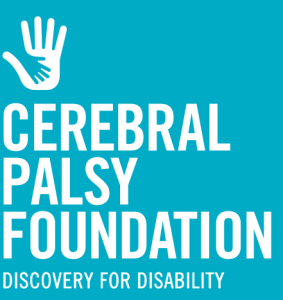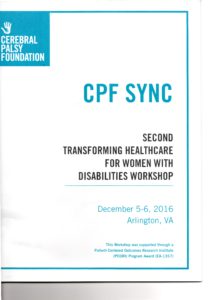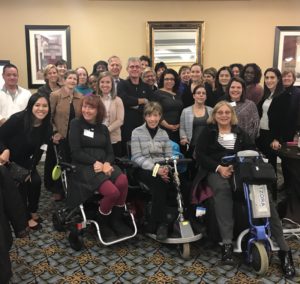 This week, I participated in the second phase of “Transforming the Healthcare of Women with Disabilities” to discuss the implementation and outcomes of the four pilot projects designed in Phase I to improve gynecological, mammography and breast care for women with disabilities. The Cerebral Palsy Foundation (CPF), through its Women’s Health Initiative, is leading a multi-part project: survey of women and health care providers regarding obstetrical, gynecological, and breast care for women with disabilities; review and analysis of survey data by representative stakeholders at a first workshop; and finally, review of the pilot research results and design of prospective patient-centered research at a second workshop. I was honored to be among such an accomplished group of women leaders in health and disability to provide input to the effective implementation and marketing of the pilot projects at four leading hospitals. We spent two days engaging with national policy leaders and physicians, practioners, and patient advocates from the leading pilot partners: The Weinberg Family Cerebral Palsy Center at Columbia University Medical Center, The Complex Care Service at Harvard’s Boston Children’s Hospital, The Rehabilitation Institute of Chicago and Northwestern University and The Center for Cerebral Palsy at the UCLA Medical Center.
This week, I participated in the second phase of “Transforming the Healthcare of Women with Disabilities” to discuss the implementation and outcomes of the four pilot projects designed in Phase I to improve gynecological, mammography and breast care for women with disabilities. The Cerebral Palsy Foundation (CPF), through its Women’s Health Initiative, is leading a multi-part project: survey of women and health care providers regarding obstetrical, gynecological, and breast care for women with disabilities; review and analysis of survey data by representative stakeholders at a first workshop; and finally, review of the pilot research results and design of prospective patient-centered research at a second workshop. I was honored to be among such an accomplished group of women leaders in health and disability to provide input to the effective implementation and marketing of the pilot projects at four leading hospitals. We spent two days engaging with national policy leaders and physicians, practioners, and patient advocates from the leading pilot partners: The Weinberg Family Cerebral Palsy Center at Columbia University Medical Center, The Complex Care Service at Harvard’s Boston Children’s Hospital, The Rehabilitation Institute of Chicago and Northwestern University and The Center for Cerebral Palsy at the UCLA Medical Center.
Key to the discussion was looking at the process of the implementation and execution of each pilot. We identified clinical process improvements and ongoing gaps with practical, lived solutions such as ensuring medical offices use universal-design equipment including adjustable exam tables and captioning video marketing materials. We discussed social media and partner communication channels for marketing the pilot outcomes to key audiences such as providers, physicians, and rehabilitation professionals as best-practices for optimizing healthcare for women with disabilities. I provided the example of being a healthy, active woman with a disability who skis Black Diamonds and how having quality healthcare enables me to have an “athletic” lifestyle–in body, mind and spirit. Being healthy allows me and others to live the dream as we choose–on and off the slopes! Thank you to Richard Ellenson, the staff at CPF and the terrific women (and men) who I was privileged to work with to inform and execute this healthcare transformation project for women with cerebral palsy. The project was supported through funding from the Patient -Centered Outcomes Research Institute (PCORI) and 100 Women in Hedge Funds. 

